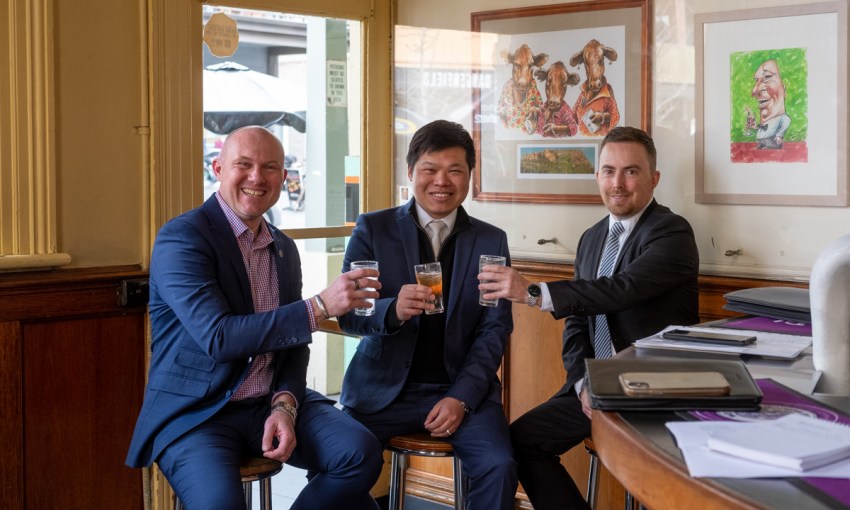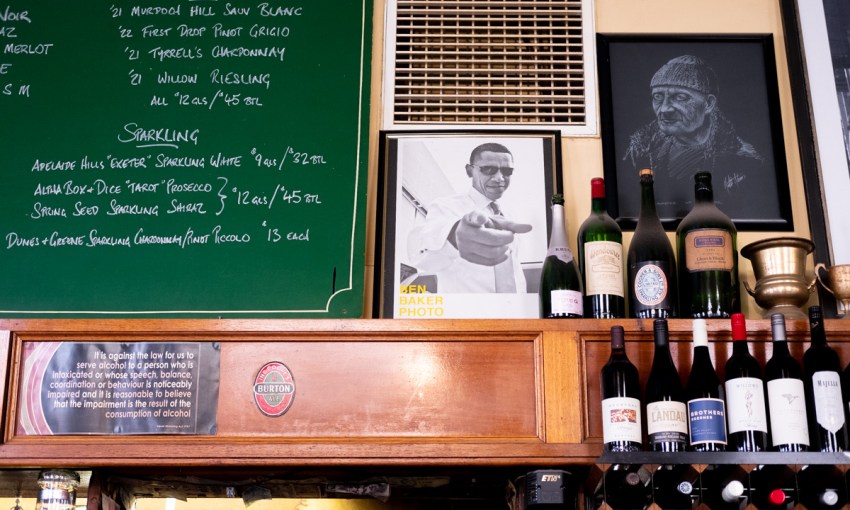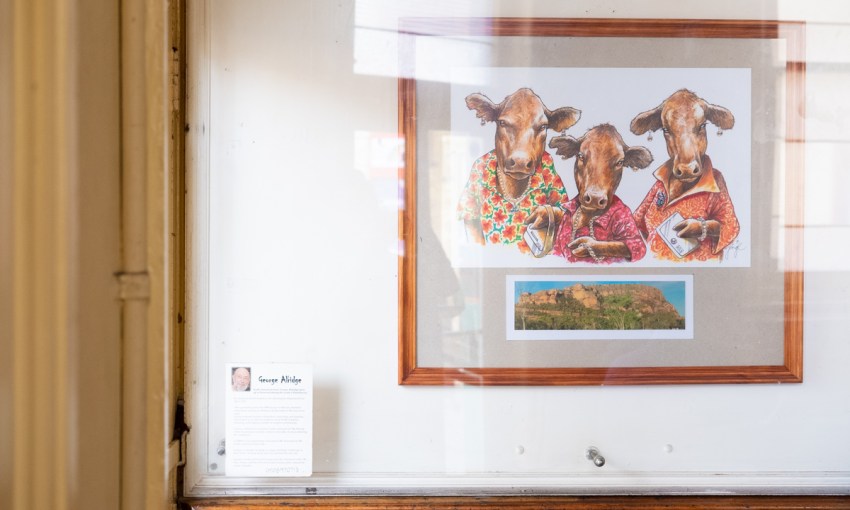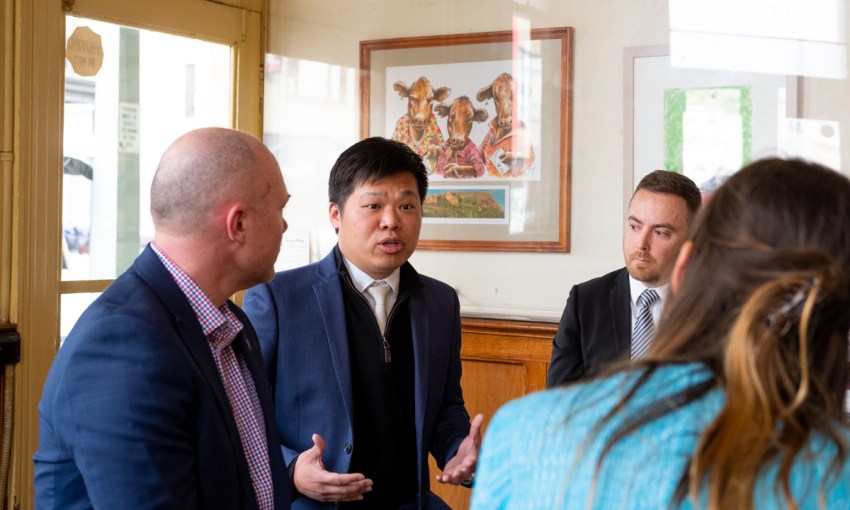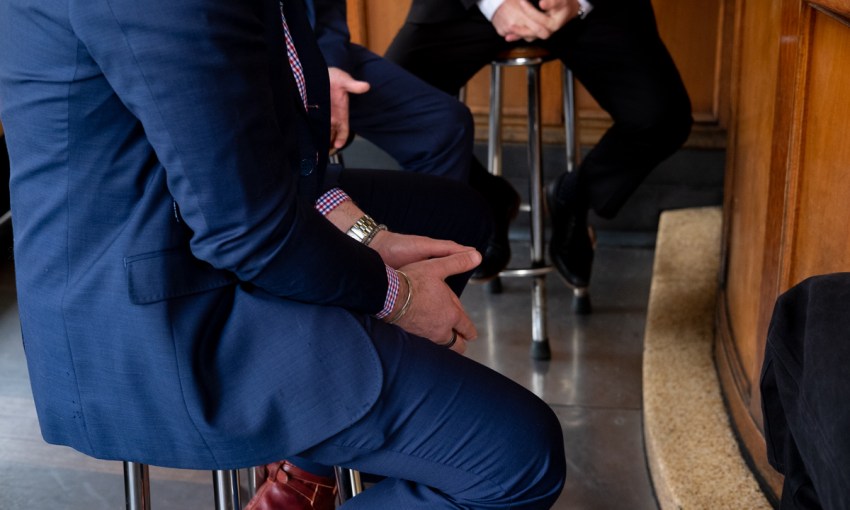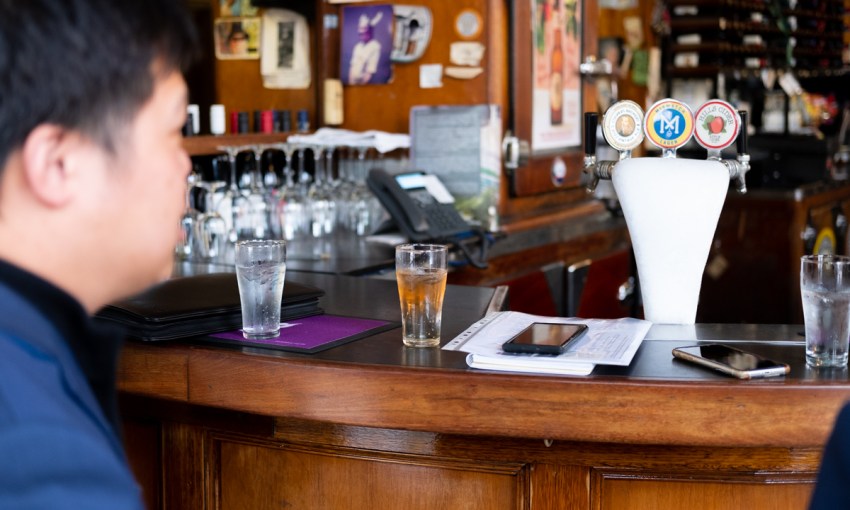CityMag invited three wannabe Adelaide city councillors to decorate the mahogany in the Exeter's front bar while debating how they would change the city if successful in the upcoming council elections.
Front Bar Diplomacy: Council candidates debate EV, city safety
There’s something about politics and the pub that just works.
We’re not alone in this thought. Former Prime Minister Bob Hawke famously skulled many beers for our country. Freshly minted Prime Minister Anthony Albanese also recently downed a frothy boi at a Gang of Youths gig.
The appeal that lies at the bottom of a glass is the notion that booze is an equaliser – it puts you on level footing with your leaders.
It’s 2:30pm on Monday and we’re at the Exeter Hotel on Rundle Street. CityMag is joined by three men with barely differing front-bar orders, all bound by a desire to make Adelaide a better the city.
Finance manager Hugo Siu orders a lemon, lime and bitters, while financial planning consultant Ben Ayris and environmental sustainability expert Mark Siebentritt order some spruced-up H2O.
We’ve invited these Adelaide City Council candidates for 30 minutes of conversation as part of Front Bar Diplomacy – a new series in which we will speak to a handful of aspirant politicians about who they are and what they want to do if successful in the upcoming elections.
Although we ran our inaugural FBD session before the full nominee run-sheet was made live yesterday (there are 39 candidates in total), the trio we’ve brought together today join the three candidates we’ve already met: Janet Giles, Henry Davis and Sean Cullen-Macaskill.
New here? Sign up to receive the latest happenings from around our city, sent every Thursday morning.
Hugo and Ben are campaigning for a central ward seat (of which there are four), while Mark is running for south ward seat (of which there are three).
Without further ado, here are the Front Bar Diplomacy highlights, edited for clarity and concision.
Cheers!
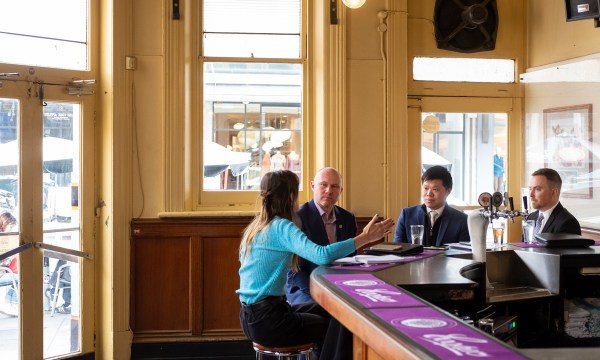
CityMag: What is your drink of choice at the pub?
Mark Siebentritt: Stout from the Gilbert Street Hotel.
Hugo Siu: Cider.
Ben Ayris: Probably a Chardonnay or Sauvignon Blanc from the Adelaide Hills. I like wine.
CM: There’s that saying that you shouldn’t discuss politics at a party or the pub. Do you?
MS: I always do. I love politics. Any opportunity when friends or family are up for a discussion – and it happens quite a lot – we’re up for it. And I think we’re going to see a lot of it. We were just talking, there are 15 to 20 candidates between the central and south ward. We’re going to see it a lot.
HS: Yes. Especially a lot of our friends are from overseas as well, so I think it’s a good opportunity to tell them how the democratic system works in Australia. I’m from Hong Kong, so I like to talk about politics.
BA: Not so much. My friends aren’t interested in that. But I would say in the last few years – because I manage the strata in my building – everyone wants to know what’s going on in the city. Especially with the state election.
CM: Let’s veer towards the Adelaide City Council, your aspiring new (part-time) workplace. What is wrong with the city?
MS: Wherever I go knocking on doors at the moment, one of the things people always say is ‘We’ve got to restore trust’. That’s paramount.
I run a sustainability consulting business and sustainability is another one of the big things. Once again, when I’m out speaking to people on the street, that’s something that they raise. The City of Adelaide has a good track record, but there’s a lot more that needs to be done. We’ve got carbon-neutral council operations, [but] we need to now know what carbon neutral means for the city as a whole. That means batteries and electric vehicles.
Then the third one, which is close to both residents and businesses, is how do we bounce back from COVID.
HS: My policy, especially my first media release, the majority is around city planning and why the council hasn’t intervened in the detail of the planning. So, why is there no infrastructure to incorporate into development plans a certain percentage of car parks for EV?
If you’re looking at the number of parking in the city, more than 2000 of [it is] on-street parking, but, unfortunately, we only have 40-plus charging stations in the city. Councils should encourage that as a topic when we want to go green.
CM: What do you think, Mark? This is your area of expertise.
MS: There is not a single EV charging spot in the public in the south ward. Not a single one. We need a roadmap on how to transition. It is one of the biggest changes I think we’ll see to our communities, and it is also going to change the way that we interact with the streets.
—Mark Siebentritt
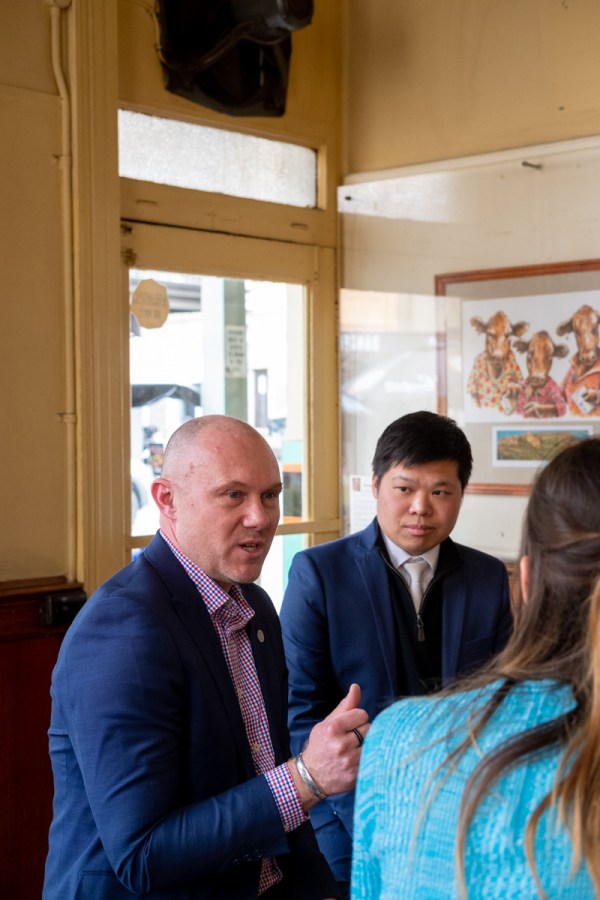
CM: What do you think, Ben? We haven’t heard your hot-take on what’s wrong with the city.
BA: In the apartment building that I’m in now – a high-rise apartment building – there are over 200 apartments, so over 300 cars. But not one EV charging station. We’ve now had to look at retrofitting it and the cost is ridiculous. Well over a million dollars for the whole building.
It needs to be put into the planning processes for the upcoming high-rises that are coming through, because it is the future.
I’d also like to see the city a lot safer, so increased lighting through the park lands, particularly.
CM: What data are you referring to in terms of city safety? Do you have any proof that the city is unsafe?
BA: The people I’ve spoken to avoid the park lands at night time because it’s dark and they don’t feel safe. They have said to me that if there was more lighting, they would use the paved pathway.
MS: Can I pick up on Ben’s point around safety? I was door-knocking on Hutt Street around the weekend and that was something that came up. When we talk about revitalising Hutt Street [and] having a safer space to get around, it was really highlighted as being important, and streetlights.
HS: I would like to add a point about the topic of lighting. When people want to set up their own businesses [that’s] not in this business central area, I think it’s also [about] having proper lighting and adequate lighting. To ensure people working late [have] light is really important. It is a cost-effective way to deter all crime.
CM: But surely you won’t eradicate all crime with a couple of light bulbs?
MS: The view is, generally, busy streets are safe streets. The more people you have out on the streets at nighttime, going around local businesses, the more people around means the less crime you have.
CM: Ben, is there anything else you want to add?
BA: I also feel that the current council in particular is very political and I’m also concerned with the amount of people nominating [who are] coming from political parties. It’s a big issue where people are trying to push their own political career by starting off in the council and then moving through. It’s to the detriment of the ratepayers.
There are other people that do live here, have businesses here, [and] we have no political motivation other than genuinely to listen to people and to make a difference. That’s it.
—Ben Ayris
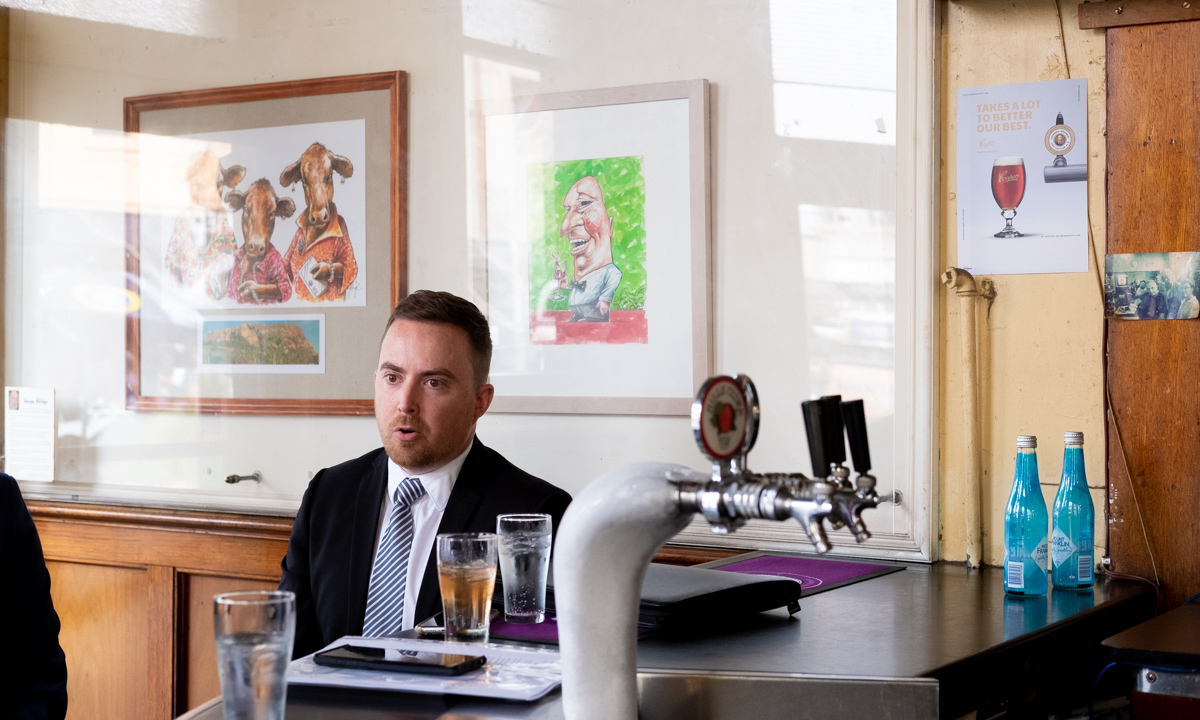
CM: And how would you fix that?
BA: I mean, I’ve got my career. I’m not interested in politics. I’m just interested in listening to people and helping make the council a better place.
CM: While we’re on political parties, does anyone have any affiliations they would like to declare?
MS: I’m a member of the Australian Labor Party. For me, though, politics, particularly at local government level, is all about consensus building. The question today, at a local government level, to me, which is more about operating like a board, a community board, is how do we find consensus? And consensus is going to mean that we don’t always have one view wins the day.
HS: I was a Labor member in 2018, but why I stopped paying my membership is, I think some [members] of the political party haven’t been actually talking to the local residents to see what they actually needed.
CM: Are you solo drinkers at the pub or do you usually buy rounds of drinks for everyone?
MS: I tend to buy rounds.
BA: I’m the same.
HS: I am the same.
CM: The reason I ask is that this council has been quite factionalised and divided. How are you going to navigate these factions when you enter the chamber? You all say you’d shout people, so does that mean that you’re going to be a team player if elected?
BA: Throughout my whole life, I thought I have always been balanced. As I said before, I’m not a member of a political party. I’m not a member of a faction, I listen to everyone’s views and opinions. And I’ll make a decision based on that independently from my own experience and from what other people are saying.
But I certainly have no intention of always backing someone’s position just because that will make things easier in the future. That’s not going to give the right outcomes to the city. That’s not going to be the right thing by me morally, either. It’s just not an issue for me. I do know that both sides will try and take whoever is elected on to their faction, but I’m really not interested in it.
CM: How do you know that?
BA: Because of some contact that I’ve had from people already who have asked if I would go and be aligned with them.
CM: Who asked you?
BA: I’d rather not say at the moment.
SH: For me, definitely, I am happy to work with all elected members. There will be some people there from different political backgrounds, and different people have different agendas. But I think when we go back to the basics of what we are really positive about: we want to keep our city safe, we want to keep our city sustainable, have a good environment in the future, we can be united.
—Hugo Siu
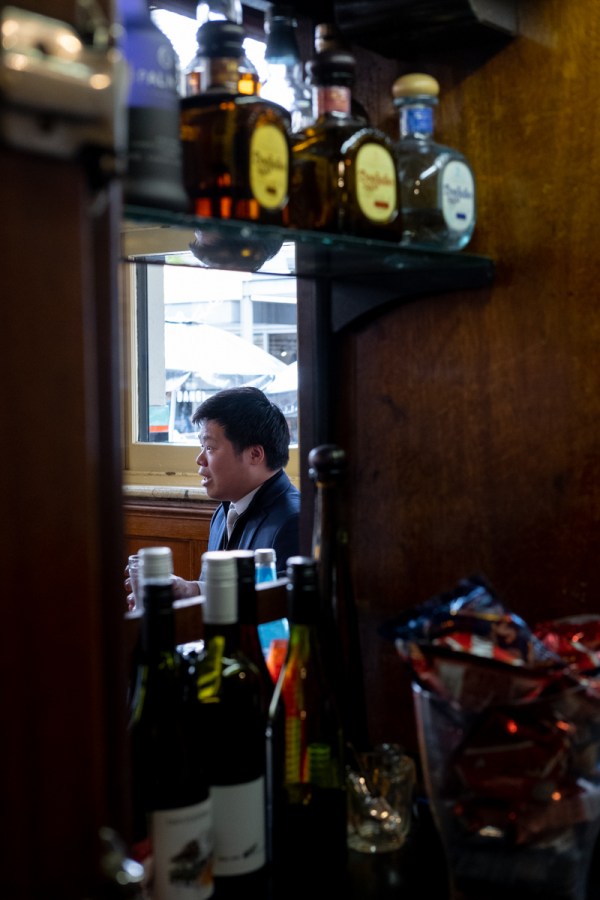
MS: From my perspective, so I’ve had 20-plus years of experience around boards and committees, early days was the Murray Darling Basin Commission, which was hard yards. But the thing I learned around that is it’s about how do you build consensus? A winner-takes-all approach is not going to win the day. It might win one argument at a time, but ultimately doesn’t build the type of support around an idea you need to implement. I’m all about seeing ideas go into action. We really need to avoid the sort of winner takes all, because it creates winners and losers, which, ultimately, no one does win out of it.
CM: Why are you three the best person to fix these problems you’ve outlined?
MS: The story around my business was that 13 years ago I realised that more needed to be done on climate change, and so I thought, I’ll put my hand up to do that. I left a stable job and took a risk and created a business, and now we employ well over 90 people on sustainability issues. The thing I’m confident about as I work with governments, businesses every day, around Australia and elsewhere around the world, turning talk into action, and so now it’s my time to give back.
HS: I’m not someone that can say a lot of fancy things, but because of my background as a CPA accountant, I always need figures and evidence – real evidence – that will back up all the policy. If you have that mindset, with this policy in the background, I don’t have any issue [with] all other members of the chamber.
BA: As I said before, I’m independent, I’m approachable so I’m happy to talk to everyone, listen to everyone. And being a city that’s full of concrete, we really need to start planning for that now. Trees take time to grow. I just really want to see Adelaide improve its image as a council as well. There’s a lot of negative publicity. It’s going to take time to change the culture, but I would love to be part of that culture and bring in some positivity and cohesion.
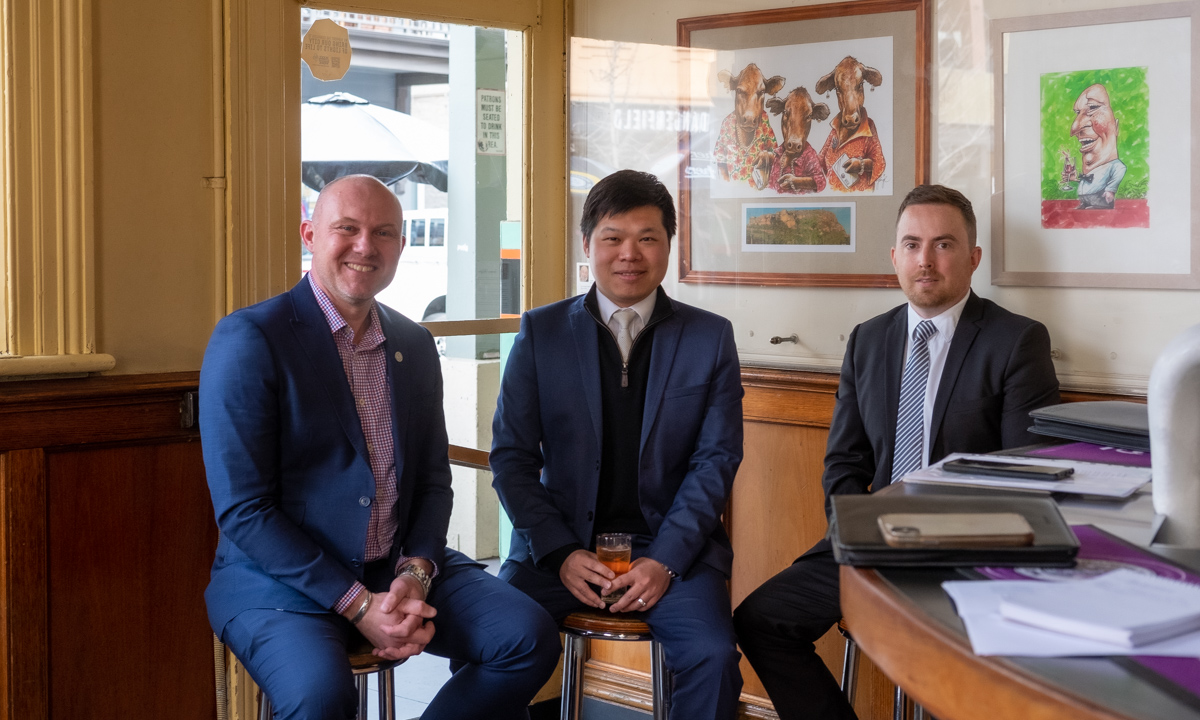
Cordial chaps



